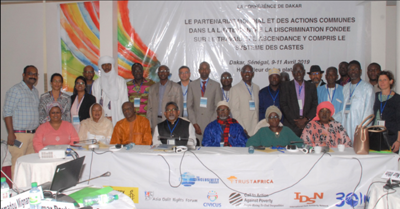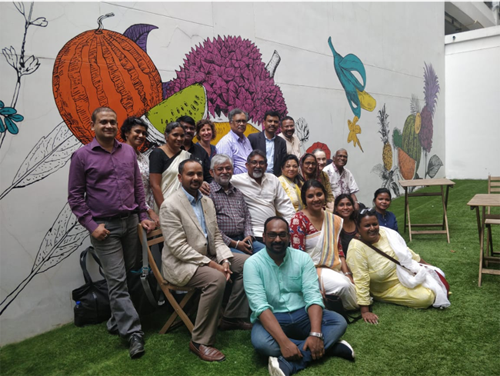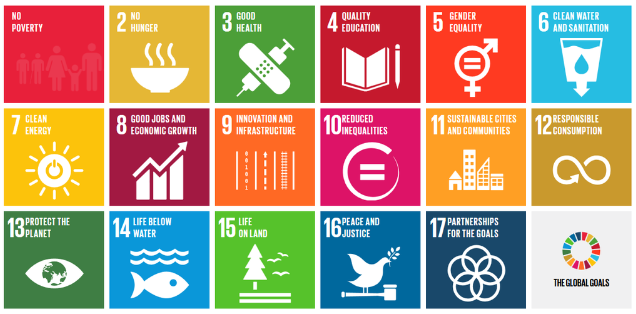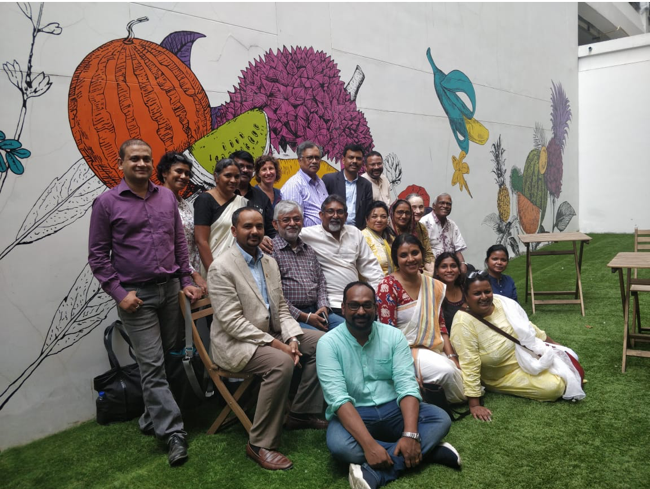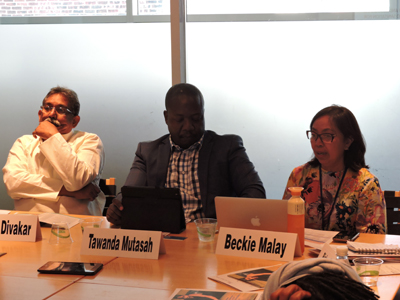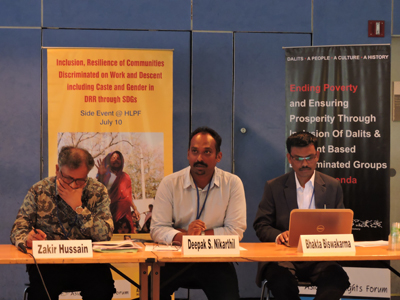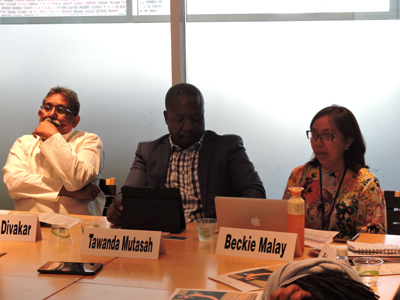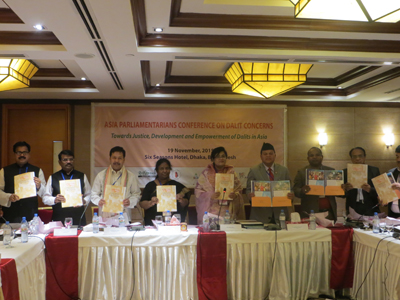Latest Interventions
Dakar Consultation on Global Partnership and Joint Actions in Addressing Discrimination based on Work & Descent - DWD, Untouchability, Contemporary Forms of Slavery and Analogous Forms of Discrimination (April 09-11, 2019)
The Dakar Consultation in Senegal was an initiative launched by The Inclusivity Project (TIP), Trust Africa, Asia Dalit Rights Forum (ADRF) and Amnesty International (AI) with support from Global Call to Action against Poverty (GCAP), Free the Slaves, CIVICUS, IDSN, UNESCO in Dakar, Senegal and IMADR. The Consultation brought together a network of resource persons from similarly discriminated communities in Africa, Asia and Europe.
It included 38 representatives of the committed national and international NGOs and civil society organizations from Africa, Asia and Europe, activists, leaders of the communities discriminated based on work and descent, human rights defenders, UN experts and academics. Representatives from Senegal, Chad, Mauritania, Mali, Niger, Burkina Faso, Somalia, and Gambia represented the DWD communities in Africa.
The objective of the consultation was to understand the societal structures and hierarchies in African region that perpetuate and reproduce DWD from one generation to the next. It examined multiple forms of discrimination which can aggravate DWD when combined with, for instance, race, ethnicity, sexual orientation, age, religion, creed, disability, and gender. the consultation explored how DWD impedes human rights violations including resource allocation, access to quality education, health care and protection of the natural environment and engage in a global call to action to end such discriminatory practices in Africa, Asia including South, Central, South East, Far East, Middle East, the Americas, and the Europe. It further, examined UN human rights machinery, which imposes obligations on States to protect against DWD. The consultation tried to discover ways in which collaborative partnerships on eradicating DWD can yield efficient and effective results toward the implementation of the SDGs, the mandate of the UN Human Rights Council, as well as Regional Mechanisms. Finally, it aimed at articulating a protocol that will call for the elimination of DWD worldwide and trigger global dialogue on DWD towards its ultimate eradication through effort deployed by various international and multilateral platforms
Key Outcomes
The Dakar Declaration on Global Partnership and Joint Actions in Addressing Discrimination based on Work & Descent - DWD, Untouchability, Contemporary Forms of Slavery and Analogous Forms of Discrimination adopted towards collectively addressing discrimination based on work and descent and its forms in Africa and Globally Creation of Africa Network Against Discrimination Based on Work & Descent and Contemporary Forms of Slavery with 9 countries from Africa signed to be the members and further 5 countries showing their interest in joining the Network
Collective actions are proposed including an International Congress on Discrimination based on Work & Descent: including Untouchability, Contemporary Forms of Slavery and Analogous Forms of Discrimination on 22-23 September 2019 during UNGA in New York
INTERSECTIONALITY OF GENDER, CASTE & DESCENT BASED DISCRIMINATION IN THE IMPLEMENTATION OF SDGS Moving Towards a Poverty Free World
The Sustainable Development Goals is the new global developmental agenda which generated much debates and acceptance as the most popular development model through inclusion and participation with its people centric approach towards, policy making, policy implementation and follow up with the core focus on ‘leaving no one behind’. The positive approach propelled through SDGs has not translated into the global and national indicators, especially in terms of marginalized and vulnerable communities and their intersectionalities. Gender and caste are two major groups which have been under represented in the SDG both globally and national indicators and consultations.
Discrimination based on work and descent (DWD) is a term is used to address various forms of discrimination, including caste-, work- and birth-based discrimination with over 260 million people living worldwide, and half of this are women. It is used as a mechanism to subordinate certain groups who are then severely discriminated against and restricted in accessing social, economic and political resources and opportunities.
The women from DWD communities faces multiple forms of discrimination, on the basis of gender, class, caste and even religion or ethnicity in many countries. These multiple forms of discrimination restrict Dalit’s women’s economic rights and reinforce dependence on men and non-dalit women. Because of this economic entrapment, Dalit women also face various other kinds of exclusion, namely socio-political, civil and judicial discrimination and violence which will not be eradicated through addressing poverty alone and are vital for promoting prosperity
The side event envisages in understanding the issue, discuss the measures and practices and possible steps towards progress, inclusion and participation in the SDG process in tune with the SDG mottos of ‘leave no one behind’ and ‘life of dignity for all’.
ADRF would like to extend our gratitude for your solidarity and would like to seek support and participation in this event on12th(TBC) in New York, USA. For any information on this, kindly to Dr. Deepak Nikarthil at deepak.nikarthil@asiadalitrightsforum.org.
ROUND TABLE DISCUSSION OF DESCENT BASED DISCRIMINATED COMMUNITIES & GLOBAL CASTE STRATEGIES TO ADDRESS THEM THROUGH SDGS
The Sustainable Development Goals is the new global developmental agenda which generated much debates and acceptance as the most popular development model through inclusion and participation with its people centric approach towards, policy making, policy implementation and follow up with the core focus on ‘leaving no one behind’. With all the positive signs through this paradigm shifting global developmental agenda, there are concerns its reach and impact on the traditionally marginalised and socially excluded communities.
The need for inclusion of the 260 million plus discriminated communities based work and descent and similar structurally discriminated would be crucial for the success of any inclusive and people centric global developmental programme.For any systemic and transformative action, the primary focus should be towards ensuring the development translating into yield positive and progressive resultsfor these communities. With High Level Political Forum reviewing the countries progress in achieving the inclusive, transparent, accountable and participatory SDG process in the UN HQ, the issues addressing the inclusion and participation the traditionally discriminated communities in development have mostly been ignored nationally and globally.
The roundtable aims to engage various communities and leaders around the world who faces discrimination based on work and descent, caste or similarly discriminated groups to discuss, share and plan towards engagement, solidarity and cooperation with each other and staging a platform towards working together for commonly addressing the issue.
ADRF would like to extend our gratitude for your solidarity and would like to seek support in co organizing and participation in this event on13th(TBC) in New York, USA. For any information on this, kindly toDr. Deepak Nikarthil at deepak.nikarthil@asiadalitrightsforum.org.
Global Parliamentarians Conference on Discrimination based on Work and Descent; 25-26 February 2016, Kathmandu, Nepal
Introduction
Caste based discrimination is one of the major forms of discrimination in the world. Within the international discourse Caste-based Discrimination (CBD) is referred to as Discrimination based on Work and Descent (DWD). Often misunderstood to be South Asia centric, it is in fact a reality found across the globe. A total of 260 million people across the globe are estimated to face discrimination based on descent and work—Dalits (South Asia), Burakumin (Japan), Osu (Nigeria & Cameroon), Borana (Ethiopia, Somalia, Kenya), Romani (Europe and the Americas), Quilombolas (Brazil) and other similar communities. They comprise over 3.5% of the world’s 7.4 billion population. Of these 260 million, around 210 million or 80 per cent, known as Dalits, live in South Asia: India (16.6 percent of the total population, or 201 million), Nepal (13.6 percent in the total population, or approx. 3.6 million), Bangladesh (5.5 to 6.5 million), Pakistan (1 to 2 million) and Sri Lanka (4 to 5 million).
These Dalit communities are at the very bottom of the caste hierarchy which defines the kind of social organisation in the region. They are distinguished from others based on their occupation, which is seen to be of low status; live in segregated spaces; and, are severely discriminated and restricted in accessing social-economic and political resources and opportunities. They continue to be subjected to traditional or/and modern forms of ‘untouchability’ practices, or the imposition of social disabilities by reason of their birth into ‘low castes’. As a result of all these factors, they are at the bottom of all the development indicators in each country. Whenever they assert their rights, violence or atrocities of different kinds are unleashed on them in order to obstruct their social mobility through accessing rights, thereby to ensure that they maintain their status quo position in society. There are both commonalities and differences in the way caste is manifested on the ground across the South Asian Region, the universal feature being inequality, discrimination and social exclusion.
Needless to say, therefore, that caste based discrimination is one of the worst forms of heinous crime targeted against particular social groups in history. Urgent collective action is needed, therefore, to eradicate this historical scourge of humankind on the one hand and restore the dignity and self-respect of the affected communities on the other hand.
About Asia Parliamentarians Forum on Dalit Concerns
It is against this context that Parliamentarians from Bangladesh, India and Nepal, in solidarity with the Asian Dalit Rights Forum (ADRF) which is a collective of members from civil society organizations working for Dalit Rights cause, came together on 08 December 2013 in Kathmandu for thefirst South Asian Parliamentarians’ Conference on Dalit Concerns: Enabling Equity and Inclusion, and again, on 25 November 2014 in Kathmandu, on the eve of the SAARC summit, along with Parliamentarians from Pakistan, for the second South Asian Parliamentarians’ Conference on Strategies to Address Dalit Rights in Asia. These two Conferences, also attended by government officials, academics, Dalit and other civil society organisations, acknowledged the huge challenge of eradicating caste based discrimination across the region. Parliamentarians shared the contributions made by their respective parliaments and the government responses in addressing this challenge. The meeting also identified the need to build strategic alliances among Parliamentarians across the South Asian Region in promoting equity and social justice, with a specific focus on addressing caste discrimination. Both Conferences came to a close with the release of Declarations with all the Parliamentarians as signatories.
As an outcome of these two Conferences, Parliamentarians decided to formally come together both at the national level as well as on a regional platform called the Asia Parliamentarians Forum on Dalit Concerns (APFDC). Started in Kathmandu in 2013, APFDC met annually for the last four years, and held side events during SAARC Summit (South Asia Association for Regional Cooperation) in 2014 at Kathmandu, Nepal. Then APFDC met twice in 2015 – once during the SDG Declaration Week in New York and later in Dhaka, Bangladesh.
The Forum looks forward to:
· enhancing the human rights mechanisms available at the global level to address Dalit rights and entitlements;
· evolving at regional level effective mechanisms to address Dalit rights and entitlements;
· reviewing and strengthening the national mechanisms in countries which already have such structures to address Dalit issues but which require the gaps in implementation to be plugged; and,
· exploring ways to evolve policy and legislative mechanisms in countries where these do not exist so that the Dalit communities can be officially recognized as discriminated and excluded, thereby ensuring the scope for their development through affirmative action in such areas as land allotment, livelihood entitlements, education, employment, budgetary allocation, political representation, etc.
The aim of the Forum, therefore, is:
· to engage with governance institutions and actors in South Asian countries, individually and collectively, to address Dalit concerns in South Asia.
· to enable Parliamentarians from across the region to share knowledge and learning that can strengthen the work being done in their respective countries towards promoting equitable and inclusive growth and development.
The Forum’s member Parliamentarians are convinced that networking to promote good practices in addressing caste based discrimination and ensuring social justice is a vital step towards fostering peace, and cooperation and development in the region.
Role of the Parliamentarians in Addressing Caste based Discrimination Worldwide
Parliaments are at the core of democracy. Parliamentarians, as members of this apex democratic institution, embody the will of the people in government. The past few years have witnessed numerous efforts by South Asian parliaments to engage more effectively with the public by becoming more representatives of their electorates, more accessible and accountable to them, more open and transparent in their procedures, and more effective in their key tasks of legislation and scrutiny of government.
The parliamentarians, policy makers and political leaders who support social justice and equity have helped immensely in heightening and sharpening thenational attention to the issues of millions of Dalits and other excluded communities, especially their social exclusion and caste based discrimination. The constitutions of the countries ensure that there are parliamentarians from excluded communities who, alongside other parliamentarians, will voice the concerns and interests of the excluded, and actively work to undo the historical wrongs done to them. These are pre-eminent people who can think, lead and act. There has been some legal and institutional progress with national commitments to make laws and policies for the inclusion of the caste affected communities through affirmative action, prevention of caste-based violence, social security nets and anti-discrimination provisions.
In recent years the UN policy of Sustainable Developmental Goals (SDGs) has been adopted as global developmental agenda for inclusive and participatory development. However, it is very regrettable that this policy fails to mention, or specifically address,the grave issue Discrimination based on Work and Descent (caste). There is an urgent need, therefore,to address the inclusion of the Dalit issue in the SDG policy as the huge number of 260 million Dalit people are affected by caste discrimination.With SDGs now solidifying as a crucial development yardstick, there is an increased need for the inclusion of the most vulnerable and excluded communities in the world by promoting their participation and ensuring accountability and transparency regarding whatever responses are made for their overall safety, security, welfare, development and progress.
Global Parliamentarians Meet on Dalit Concerns
APFDC and ADRF plans to have a two-day Conference which will bring together Parliamentarians, Human Rights Experts and Dalit Leaders and those in solidarity from across the globe including Germany, Austria, UK, European Union, Japan and other countries. This Conference will focus on bringing together all the DWD and excluded communities in order to collectively voice out the need to address their recognition and share in the developmental programmes as well as socio-economic, political and legal inclusion for welfare and livelihood.
In specific terms, the Conference will focus on the Dalit Women’s concerns in the areas of Affirmative Action, Access to Justice of Dalits, Right to Development, Gender Justice, Youth and Child Rights, Disaster Risk Reduction and Political Participation of Dalits. This will be done in the overall background of ensuring a non-discriminatory Sustainable Development Goals.
This Conference, hosted by APFDC and ADRF and supported by IDSN (International Dalit Solidarity Network) will be held in the last week of Feb. 2017 (25-26 Feb) in Kathmandu, Nepal.We appeal to all to extend support to this event and the noble cause behind it.
ADRF Interventions in APFSD, March 2019: Empowering People and Ensuring Equality and Inclusiveness
The theme of Asia Pacific Forum on Sustainable Development (APFSD) 2019- 'Empowering People and Ensuring Inclusiveness and Equality' could be possible through countries commitment to ensure that there is an equitable distribution of the resources and services. To be true to the motto of 'Leave No One Behind' the SDG implementation should ensure the inclusion and participation of the all marginalised communities including women, youth and children, migrants, scheduled caste, indigenous people, people with disabilities, sexual minorities among others.
Reducing inequalities within the countries is a strong statement, which categorically points out towards socio-economic and political equity and erasing of any discriminatory mechanisms, which propels inequality among the people.
Excluded communities are most marginalized groups with their social, economic, political and cultural segregation, with standing compared to others are impuissant. The inequalities exist in various services like education, hunger, health, water and sanitation, employment, land and housing, disaster risk reduction among others, which are represented in SDGs through definite goals. Gender and peace and justice other determinants which propels inequalities within the countries.
The entire plan of the events and conferences in Bangkok was to have very strong interventions on the inclusion of Dalits in SDGs and asking for a constituency for Dalits within the Asia Pacific Regional CSO Engagement Mechanisms (APRCEM) and thus in ESCAP.
Key Outcomes of the meeting:
1. Successful initiation of the Dalit and DWD constituency as the 18th Official Constituency within the Asia Pacific Regional CSO Mechanism (APRCEM) in realizing Sustainable Development Goals in Asia Pacific.
2. First Dalit constituency meeting held in the Asia Pacific People's Forum on Sustainable Development (APPFSD) with participation from Dalits and DWD community representatives from Asia.
3. ADRF Chair Paul Divakar and ADRF member Bhakta Biswakarma delivered the Dalit statement in the APFSD 2019.
4. APPFSD Workshop on Gender, Caste and Intersectionalities; Challenging inequalities and accessing Development Justice was conducted with Dalit representatives and solidarity representatives from women against violence and indigenous women being in the panel discussion.
5. APPFSD Workshop on Are we on track to reduce Inequalities Within? Looking at the implementation of SDG10 for most marginalized communities including Dalits, farmers, migrants and other major groups.
Inclusion in SDG6: Water and Sanitation- A Debate on Abolishing Manual Scavenging and other Caste based Labour (American Scandinavian Centre)
Sustainable Development Goals and its targets is the global developmental programme introduced by the UN as the successor of the Millennium Development Goals (MDGs). SDGs were accepted by 195 countries in 2015 as the primary developmental programme for 15 years till 2030, calling it Agenda 2030. The focus on the people centric approach and principles of accountability, transparency and participation ensures that SDGs are a model of holistic development. However, with all the positive signs of this paradigm shifting global developmental agenda, there are concerns as to its reach and impact on the traditionally marginalised and socially excluded communities.
Who are the Dalits?
The Dalits are the about 260 million people born into communities that face work and descent based discrimination, including untouchability and stigmatisation from caste or caste like systems globally. In India, they are the socially excluded communities outside the Hindu caste system who were formerly considered untouchable. In India, they are administratively classified as the Scheduled Castes (SC). The Scheduled Castes comprise 201,378,372(16.6%) of India's 1.21 billion population.[i]
This report also covers the Adivasi (literally first-dweller), the indigenous and tribal peoples, administratively classified as Scheduled Tribes (ST) since Dalits and Adivasis are clubbed together in law and administration.[ii] The Scheduled Tribes comprise 104,545,716 (8.6%) of India's population.[iii]
These communities are subjected to the worst forms of exclusion, stigma and violence based on their caste, work, descent and identity. They are considered as ‘lower’ in status, ritually ‘impure’ and ‘polluting’ and thus isolated physically, socially and politically from other castes and communities of the society. They are subjected to a colossal amount of violence and atrocities, perpetuated by ‘higher’ status communities and the state. In addition to the gross violence, these communities are excluded from various public and private resources and services for development and welfare.
Goal 6 Water and Sanitation
Poor quality of drinking water and lack of awareness about hygiene and improved sanitation are major sources of water borne diseases amongst tribal areas. The national average for household connectivity for waste water outlets is 51.1% but for SC households it is 46.6% and for ST households it is 22.7%.[iv]
The proportion of SC households without toilet is much above the national average. Only 33.86% of Dalit households and 22.64% of Adivasi households have toilets compared to the national average of 47%. Only 41.28% of Dalit households and 24.44% of Adivasi households have tap water within the house compared to the national average of 43.5%.[v]
Goal 6 and Manual Scavenging
The practice of manual scavenging is absolutely contravention of articles - 14, 17, 19 and 21 of the Indian constitution. The constitution bans the practice of untouchability, protects the civil rights and prohibits the act of compelling any one to practice manual scavenging in any form anywhere in India. Moreover, the constitution clearly recognizes a constitutional obligation to correct the historical injustice and indignity suffered by manual scavenging communities by providing them alternative livelihood and proper dignified rehabilitation. 'The Employment of Manual Scavengers and Construction of Dry Latrines (prohibition) act, 1993 and the act of 2013 clearly stated that the Employment of Manual Scavengers and construction of dry toilets to be punishable with fines and imprisonment .The concerned acts also categorically recognises the need of effective alternative livelihood and other assistance.
Of the 770,338 manual scavengers and their dependents across India,[vi] so far only 427,870 persons have been assisted under the National Scheme of Liberation and Rehabilitation of Scavengers (NSLRS) and the remaining 342,468 yet to be rehabilitated.[vii] As per the Public Interest Litigation[viii] filed in the High Court of Delhi, Indian Railways, a public sector enterprise owned and managed by the Government. of India (GoI), which employs a large number manual scavengers who clean human excreta is a violator of the Employment of Manual Scavengers and Construction of Dry Latrines (Prohibition) Act of 1993.
Irrespective of repeated denials of the Indian Railways, the practice of manual scavenging is still uninterruptedly continuing in the entire Railway system. Perhaps, the Authority of Indian Railways is not ready to modernize the mode of cleaning systems by introducing the modern Bio-toilets and Vacuum toilets (these modes of cleaning are already in operation in the entire European countries and aeroplanes) in place of the existing 172000 open discharge toilets of the Indian Railways. This is because of the huge investment required for the modernization of Indian Railway cleaning systems in the country. To avoid this necessary huge investment for the modern cleaning of human excreta mechanically from the entire Railways, the Railway authorities blatantly and shamelessly using the thousands of poor Dalit manual scavengers in the second largest Railways of the world through the inhumane and irresponsible contract system.
The side event tries to analyse the issues of caste based inhuman occupation, which are in directly contradicting the ideology of Sustainable Development Goals. The objective of this side event is to find different recommendations through discussions to further the step towards elimination of Manual scavenging and caste related hazardous occupations.
[i] Census of India 2011.
[ii] For instance the Scheduled Castes and Scheduled Tribes (Prevention of Atrocities) Act and the Scheduled Tribes and Other Traditional Forest Dwellers (Recognition of Forest Rights) Act 2006.
[iii] Census of India 2011.
[iv] Census of India 2011, House listing data.
[v] Census of India 2011, House listing data.
[vi] Annual report of the Ministry of Social Justice and Empowerment (Government of India 2009), The highest number of manual scavengers was in Uttar Pradesh (2,13,975), followed by Madhya Pradesh (81,307), Maharashtra (64,785), Gujarat (64195), Andhra Pradesh (45,822) and Assam (40,413).
[vii] Annual Report of the Ministry of Social Justice and Empowerment, 2009
[viii] The Writ Petition {W.P.(C) -845/2011} in the Delhi High court on the Indian Railways.
Inclusion and Resilience of Communities Discriminated by Work and Descent including Caste and Gender in DRR through SDGs (American Scandinavian Centre)
The Theme of High Level Political Forum (HLPF)-Transformation towards sustainable and resilient societiescould be possible through countries commitment to ensure that there is an equitable distribution of the resources and services. While the overarching statement of “Leave No One Behind”, the SDG implementations have structurally failed to recognize certain constituencies in its impact. Among them, one of the most important is Discrimination Based on Work and Descent (DWD).
Discrimination based on work and descent (DWD) is the UN terminology for caste discrimination. The term has been used by several UN human rights bodies, including by treaty bodies and Special Rapporteurs, reaffirming that this form of discrimination is prohibited under international human rights law.It continues to be one of the most wide ranging human rights violation that has been prevailing for decades and have affected almost 260 million people globally. The highest numbers of affected communities are concentrated in South Asia[1]. Other communities who faces such discrimination are Burakumin (Japan), Al Akhdam (Yemen), Quilumbo (Brazil), Osu and Oru (Mali; Mauritania; Senegal; Nigeria and Chad), Romani (Europe), and the Dalit Diaspora in Malaysia, Europe, North America etc.
The women from DWD communities have faced further exclusion on the basis of their class, patriarchy and caste, which has played an integral part of in defining their most vulnerable status in their respective society. These triple discrimination has forced DWD women’s access to the economic rights limited, thus they fall back in comparison to their male counterparts and non-DWD women by a mile. Because of these economic entrapments the Dalit women also face various other kinds of exclusion, namely socio-political, civil and judicial discrimination and violence, even in the post disaster management. Dalit women have little opportunity for upward mobility as they are often bound by norms in the society which force them into positions of manual labour and traditional jobs and do not provide opportunity for education and skills development. This perpetuates the poverty and illiteracy that prevents their empowerment.
UN Sustainable Development Goals have which failed to recognize DWD as major stakeholders even after consisting of almost 4 percent of the total Global population. This also results in challenges for fulfilling the commitment to leaving no one behind. Such exclusion will have an inverse effect of the country level implementation of SDG targets where there are no special or targeted actions doesn’t exist. Thus there are further chances for further discrimination and alienation from developmental policies and services. The challenge for SDG implementation is to include all the communities and provide equitable access to the services and justice for achieving the goals and targets under SDGs. The UN OHCHR Guidance Tool for Elimination of Discrimination based on Work and Descent (DWD), released in Kathmandu, Nepal in April 2017statesthat -The implementation of the 2030 Agenda for Sustainable Development should address the discrimination and exclusion suffered by descent-based communities and their experiences of inter-generational poverty. To achieve this aim, the UN and member states must place addressing inequalities and non-discrimination at the heart of its efforts to support the implementation of the SDGs and targets.
The Sustainable Development Goals, an ambitious set of universal development aspiration, have the intent of ‘Leave no one behind’ at its core. The SDGs accompanied parallel adoptions of the Sendai Framework for Disaster Risk Reduction (SFDRR) and the Paris Agreement on Climate Change. The three conventions are interdependent and mutually reinforcing means to inclusive, disaster and climate change resilient sustainable development.
The SGDs adopted Climate Action and mainstreamed Disaster Risk Reduction (DRR) across various targets and indicators, and most prominent ones are: (i) Target 1.5: By 2030, build the resilience of the poor and those in vulnerable situations and reduce their exposure and vulnerability to climate-related extreme events and other economic, social, and environmental shocks and disasters; (ii) Goal 11: Make cities and human settlements inclusive, safe, resilient and sustainable; and (iii) Goal13: Take urgent action to combat climate change and its impacts.
Regionally and nationally, official system or approach to monitor the effectiveness of international conventions is absent, while the SDGs, DRR and Climate Change Conventions compromised on the much-needed human rights approach. Sustainable development would be only an imaginary construct until the vulnerable sections aren’t ensured the required DRR and CCA assistance. This also requires having constructive public and policy discourses around equity and root drivers of poverty and vulnerability. The focus needs to locally shift to addressing the underlying social and resulting systemic gaps right at the local levels up till the policy changes to ensure integration of DRR and CCA into sustainable development through interdepartmental coordination and direct consultations with the affected communities, the Dalits and other highly marginalised groups.
[1]A/HRC/31/56 January 2016 Human Rights Council – Report of the Special Rapporteur on minority issues Rita Izsak
Global Parliamentarians Conference on Discrimination based on Work and Descent: A Special focus on Caste and Dalit Women’s Access to Economic Rights, Feb 25-26, 2017, Kathmandu, Nepal
Asia Dait Rights Forum organising a Global Parliamentarians Conference on Discrimination based on Work and Descent: A Special focus on Caste and Dalit Women’s Access to Economic Rights, Feb 25-26, 2017, Kathmandu, Nepal.
Concept Note
Programme Schedule
Participants
Asia Dalits Declaration 2017
Checklist for Inclusion of the Women of Most Marginalized and Socially Excluded Communities in Sustainable Development Goals
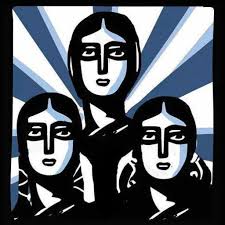
Sustainable Development Goal has dedicated Goal 5 to address the gender equality and empowering girls and women for progressive and sustainable development. The goals and targets touch upon many of the concerns have focused on women’s safety and inclusion in the participative development, the extend of the impact of the goals and targets are been questioned by many women and gender groups. There has been outcry of disappointment with the indicators has not able to justify the vast issues of concerns. Women generally face various hurdles in achieving of various goals and targets and accessing various services and welfare measures. They are systematically discriminated in the patriarchal institutional structure everywhere. However women from the DWD communities faces multi structured discrimination, based on their gender, caste, class and religion. These women have been dominated and forced to do various jobs like various traditional occupations like Devdasi system and other forms indecent jobs.
The violence against these women has been rampant, as every day there are lot of girls and women are facing physical and psychological atrocities. They face various forms of violence like rape, beating, teasing and murder in the society. They are expected to do various jobs like cleaning and washing during cultural events without pay. These kind of unpaid work has not been significantly reported in surveys and reports by the governments and nongovernmental organisations.
They are often underrepresented in the parliaments and other office of power and data disaggregation on this basis is necessary. Education on health care especially on sexual and reproductive health care is often nil to limited for the DWD women. The Sustainable Development Goals has limitation in addressing the intersectionalities within the goals when it comes to reducing inequalities among the people especially targeted towards DWD and gender. The development goals and targets as well as the indicators fails to recognize the exclusionary methodologies applied through social and cultural structures within countries. Thus addressing the issues of the most marginalized and socially excluded with the intersectionalities with gender is an integral towards the success of the development model publicized by the SDGs.
UN HLPF Side Event on Ensuring Inclusion of the Most Marginalized and Socially Excluded in SDGs
Discrimination based on work and descent (DWD) is terminology used to address various forms of discrimination including caste, work and birth based discrimination. While DWD is often identified with caste based discrimination and limited to Indian sub continent, it is a global phenomenon with various communities around the world has faced with similar kind of discrimination and exclusion. Some of the major communities who are identified as victims of DWD are Burakumin (Japan), Roma (Europe), Osu (Nigeria and Cameroon), Quilumbo (Brazil), Al Akhdam (Yemen) and Dalits (Whole of south Asia specially India, Bangladesh, Nepal, Sri Lanka and Pakistan).
Romani or Roma are a traditionally itinerant ethnic group originated from North Western India, living mostly in Europe and the Americas, who are constituted to be around 14 million. They are usually known as gypsies by the other communities, like Dalits, they face social exclusion and verbal and physical violence by other communities from the region.
The draft United Nations Principles and Guidelines for the Effective Elimination of Discrimination Based on Work and Descent (DWD), 2009 clearly states that “discrimination based on work and descent exacerbates poverty and constraints progress.” It is essential that SDG should favour primal emphasis on the descent (caste) based discrimination, if the visions is for any systematic and sizable change (development).
United Nations Special Rapporteur on minority issues, Rita Izsák-Ndiaye states “This is a global problem affecting communities in Asia, Africa, Middle East, the Pacific region and in various diaspora communities,” the expert said while stressing that “caste-based discrimination and violence goes against the basic principles of universal human dignity and equality, as it differentiates between ‘inferior’ and ‘superior’ categories of individuals which is unacceptable.”
High Commissioner for Human Rights Mr. ZeidRa’ad Al Hussein noted that ten years after the end of the internal armed conflict in Nepal, there has been little progress in addressing its root causes, including entrenched ethnic and caste discrimination, unequal access to economic resources, extreme poverty and pervasive impunity.
Asia Parliamentarians Conference on Dalit Concerns on 19th November 2015 in Dhaka, Bangladesh
Parliamentarians from Bangladesh, India and Nepal with Civil Society members participated in Asia Parrliamentarians Conference on Dalit Concerns in Dhaka, Bangladesh. 19 parliamentarians and 18 civil society members particpated in this conference which discussed theimpact and importance of Asia Parliamentarians Forum on Dalit Concerns(APFDC) in the South Asia Region towards addressing the issues and concerns of Dalits. The conference also was instrumental in shaping of the Dhaka declaration, focusing on bringing out of an exclusive framework for the Caste Based Discrimination in South Asia.
Asian Parliamentarians Consultation on Dalit Concerns
Parliamentarians from Bangladesh, India and Nepal with ADRF and CA has come together in Dhaka, Bangladesh, to discuss the direction in which caste based discrimination in the region could be addressed. The Asia Parliamentarians Forum on Dalit Concerns (APFDC) convenor Sri. Meen Bahadur Bishwakarma (Nepal) and Co-convenor Md. Israfil Alam (Bangladesh) presided the consultation attended by 15 parliamentarians from the three countries. In the wake of Bangladesh parliament bringing in reservation quota in the manual jobs for Dalits, Md. Israfil Alam has raised his voice against seggregation of Dalits through assuring only manual jobs. He called for quota in all jobs for Dalits.
Nepal in the wake of new constitution, has progressively included the Dalit rights as fundemental right. With giving the Dalit population a new found hope towards a bright future. The consultation focused on the five thematic areas for Dalit concerns: Affirmative action, Access to justice, Right to development, Gender rights and Child rights.
The Consultation expanded the thematic area with further discussion, while including, Economic and budgetary rights and Political participation.
ADRF has organized a Public Rally: Cast Out Caste in front of United Nations General Assembly on 26th September 2015 in New York demanding recognition and inclusion of Caste in the 2030 SDG agenda.
Public Meeting: Educate, Agitate, Organize for Dalit Rights in the 2030 Agenda
South Asian Parliamentarians, Civil society representatives, solidarity organisations and diaspora gathered in Dag Hammarskjold Plaza, opposite to UNGA, for public demonstration and rally during UN Sustainable Development Summit to address the inclusion of discrimination based on gender, work and descent in implementing the SDGs. More than 150 people joined in the public meeting and protest in front of UN General Assembly, demanding the promise of leaving no one behind and inclusion of caste as variable of exclusion in the SDG.
Parliamentarians and Civil Society representatives with youth activists participated in the programmes including a public performance by the youth and slogans demanding the policies and programs to address these interlinked sites of oppression, through the lens of implementation and accountability of the 2030 Agenda.Various parliamentarians and key Civil Society leaders have raised their concern of inclusiveness and participatory nature of the SDG agenda in their speeches. Many calling this to be initial step towards elimination of exclusion and discrimination based on work and descent, and inclusion in the SDG implementation process nationally, regionally and globally.
Celebrating 125 Years of Ambedkar’s Legacy
Dr. B. R. Ambedkar was the pioneer and trailblazer of Dalit Rights and equality in South Asia. The Father of Indian Constitution, throughout his life, worked towards gathering equal rights and status to the Dalits and dalit community. Honouring his legacy on his 125th Birth Anniversary by garlanding his statue in Lehman’s Library, Columbia University, followed by a seminar on the impact of Ambedkar’s ideology and legacy in structured elimination of caste based exclusion.
South Asian Parliamentarians, Civil Society representatives, members from Diaspora and Solidarity organizations expressed their perspectives on the influences of Ambedkar’s Legacy in formulating the Dalit identity and Dalit rights. Towards addressing inclusiveness of the farthest behind, according to SDGs, there is a need to adopt Ambedkar’s ideology of eliminating the bias through targeted policies and budgets for inclusion and participation in the developmental process. There should be a conscious effort towards ensuring accountability, transparency, participation and inclusion in national, regional and global (UN) level for true and successful implementation of the 2030 developmental goals.
Asia Dalit Rights Forum (ADRF) with Regions Refocus 2015 and Asia Parliamentarians Forum on Dalit Concerns (APDFC) co convened Annihilate Caste and Structural Inequalities in Implementing the SDGs, from 22 through 27 September, 2015, in New York towards a
Annihilate Caste and Structural Inequalities in Implementing the 2030 Agenda
22 – 27 September 2015, New York City
PROGRAMME
As global leaders meet at the United Nations to adopt the 2030 Agenda for Sustainable Development, a delegation of 50 South Asian parliamentarians and civil society are gathering in New York for a week of policy advocacy, strategic activism, and solidarity-building with policy makers and social movements from across the sub-continent and beyond. Echoing advocacy by activists and policy-makers from South Asia throughout the process of defining this international development framework, this delegation calls for national and international recognition of caste as a fundamental determinant for social exclusion. Through the Sustainable Development Goals, particularly Goal 10, “Reduce inequalities within and among countries,” governments in South Asia and throughout the world must facilitate the elimination of caste-based exclusion and the triple burden of class, gender, and class carried by Dalit women. These concerns are central to an inclusive development agenda that works towards structural justice.
To address this context, Asia Dalit Rights Forum (ADRF), Regions Refocus 2015, and Asia Parliamentarians Forum on Dalit Concerns (APFDC) are co-convening “Annihilate Caste and Structural Inequalities in Implementing the SDGs,” from 22 through 27 September, 2015, in New York. This pivotal year, 2015, also marks the 125thbirth anniversary of Dr. B.R. Ambedkar, a pioneer of Dalit rights and equality in South Asia.
The week-long programme includes the following components:
|
1.
|
22-23 September
|
Parliamentarian-Civil Society Regional Exchange
|
Workshop
|
|
2.
|
23 September
|
Challenging Systems of Casteism and Racism
|
Seminar
|
|
3.
|
24-25 September
|
Policy Dialogues with Parliamentarians & Permanent
|
Roundtables
|
|
|
|
Missions to the UN
|
|
|
4.
|
25 September
|
Global Youth Exchange
|
Workshop
|
|
5.
|
26 September
|
Educate, Agitate, Organize for Dalit Rights in the 2030 Agenda! Rally
|
|
6.
|
26 September
|
Celebrating 125 Years of Ambedkar’s Legacy
|
Seminar
|
|
7.
|
25-27 September
|
UN Sustainable Development Summit
|
UN meet
|
|
8.
|
27 September
|
Debrief and Next Steps
|
Dinner meet
|
1. Parliamentarian-Civil Society Regional Exchange
22-23 September 2015
22 September, 9:00am to 5:30pm 23 September, 9:30am to 1:30pm
Boro Hotel, 13thFloor James Room, Barnard Hall
38-28 27th Street Barnard College of Columbia University
Long Island City (Queens), NY 3009 Broadway (at 116th Street), New York
Examining the 2030 Agenda and its Sustainable Development Goals, participants will evaluate pertinent development objectives related to inequalities, poverty, education, health, and gender within the context of eliminating caste discrimination in South Asia. As the 2030 Agenda has failed to explicitly mention caste, participants will come together to envision creative strategies to use the SDGs, particularly Goal 10 “Reduce inequalities within and among countries,” as a tool to visibilize and address discrimination and violence faced by the Dalit community. This strategy meeting will plan towards effective interventions with the South Asian and European representatives to the UN, to discuss how the SDG framework can contribute to eliminating discrimination based on work and descent (caste).
Objectives
1. Analyze current / potential policies and their adequate / inadequate implementation at the national to regional levels.
2. Gain an understanding of the 2030 Agenda and develop a roadmap, with concrete actions by parliamentarians and civil society to shape its implementation in each country.
3. Strengthen ADRF and APFDC to address exclusion, inequalities, and violence against Dalit communities at the national, regional, and global (UN) level.
Methodology
The workshop is designed for participants to (A) analyze the policy landscape in three sessions, (B) develop proposals to implement the 2030 Agenda in two sessions, and (C) prepare for the UN Sustainable Development Summit in one session.
The first three sessions will analyse existing and potential policies in one of three clusters of SDGs – accountability and peace; gender and social justice; and economic and ecological justice. Presenters will be balanced across country and constituency. Each presentation will be no more than 10 minutes to allow ample time for discussion and exchange. The next two sessions involve group discussions and report backs. Each group will identify a facilitator and rapporteur. A final session will consolidate policy asks and political engagement at the UN Summit.
A. Analysing the Policy Landscape:
1. Briefly outline the Dalit demography in your country (using disaggregated data if available)
2. Name one progressive policy/program to advance Dalit rights (ex. successful response and/or implementation of existing laws, policies, quotas, budgets)
3. Name one pressing policy/program gap that inhibits Dalit rights (ex. non-existent responses and/or inadequate implementation of existing laws, policies, quotas, budgets)
4. Name two new and innovative responses/strategies to enhance Dalit rights (ex. state actions and/or constituency strategies for qualitative, positive change)
B. Toward Implementing the 2030 Agenda:
1. Elaborate desirable state and non-state actions at the national and regional level.
2. Identify mechanisms required to sustain the above actions.
C. Engaging Governments at the UN Sustainable Development Summit:
1. Policy Dialogue with Permanent Missions to the UN
2. Participate in UN and Parallel Events
Agenda
Day 1: Tuesday, 22 September 2015
8:45 – 9:00 Registration
9:00 – 9:30 Welcome and Introductions
• Welcome – Paul Divakar (5 mins)
• Participant Introductions (15 mins)
• Overview of Agenda and Policy Maps – Anita Nayar & Paul Divakar (10 mins) Moderator, MP – Meen Bahadur Biswakarma
9:30 – 11:00 Session 1: Analyzing the Policy Landscape – Accountability and Peace
• Nepal, MP – Jit Bahadur Darji Gautam (10 mins)
• Sri Lanka, MP – Mylvaganam Thilakrajah (10 mins)
• Bangladesh, CS – Mesbah Uddin Ahmed (10 mins)
• India, CS – Asha Kowtal (10 mins)
• Pakistan, MP – Gianchand (10 mins)
• Discussion (50 mins)
Moderator, MP – Burnad Fathima Natesan
11.00 – 11.30 Tea Break
11.30 – 13.00 Session 2: Analyzing the Policy Landscape – Gender and Social Justice
• Nepal, CS – Dulari Harijan (10 mins)
• Sri Lanka, CS – Ponniah Logeswary (10 mins)
• Bangladesh, MP – Nurjahan Begum (10 mins)
• India, MP – Ramdas Athavale (10 mins)
• Pakistan, MP – Poonjo Bheel (10 mins)
• Discussion (50 mins)
Moderator, CS – VA Rameshnathan
13.00 – 14.00 Lunch
14.0 – 15.30 Session 3: Analyzing the Policy Landscape – Economic and Ecological Justice
• Nepal, CS – Bhakta Bahadur Bishwakarma (10 mins)
• Sri Lanka, CS – Perumal Pitchai Sivapragasam (10 mins)
• Bangladesh, MP – Md. Israfil Alam (10 mins)
• India, CS – Beena J. Pallical (10 mins)
• Pakistan, CS – Sono Khangharani (10 mins)
• Discussion (50 mins) Moderator, CS – Zakir Hossain
15.30 – 16.00 Tea Break
16.0 – 17.30 Session 4: Toward Implementing Agenda 2030 (90 mins)
• Accountability and Peace – Prasad Sirivella & Ajay Kumar Singh, Co-Facilitators
• Gender and Social Justice – Vimal Thorat & Thomas Pallithanam, Co-Facilitators
• Economic and Ecological Justice – Rem Bahadur BK & Ganesh Bahadur Bishwakarma, Co-Facilitators
a. Identify three desirable state responses (including by parliamentarians) within each country and at the regional-level (ex. by SAARC).
b. Identify three non-state strategies (by civil society, women, youth, diaspora, etc.) including one on private sector accountability and one on cross-movement and regional collaboration.
c. What mechanisms are needed to sustain the above actions?
17:30 – 18:00 Facilitation Team Meet
Day 2: Wednesday, 23 September 2015
9:30 – 11:00 Session 5: Group Report Back
• Accountability and Peace – Chandan Kumar, Rapporteur/Presenter (10 mins)
• Gender and Social Justice – Deepak Nikarthil, Rapporteur/Presenter (10 mins)
• Economic and Ecological Justice – Chandrasen Bhimsen Rao, Rapporteur/Presenter
(10 mins)
• Discussion (60 mins)
Moderators: Afsana Binte Amin & Aloysius Irudayam
|
11:00 – 11:30
|
Tea Break
|
|
11:30 – 13:00
|
Session 6: Engaging Governments at UN Sustainable Development Summit
|
|
|
?
|
Policy Dialogue with Permanent Missions to the UN
|
|
|
?
|
UN and Parallel Events
|
Moderators: Anita Nayar & Paul Divakar
|
13:00 – 13:30
|
Wrap up Paul Divakar
|
|
13:30 – 14.30
|
Lunch
|
2. Challenging Systems of Casteism and Racism
23 September, 2:30 to 5:00pm
James Room, Barnard College of Columbia University 3009 Broadway (at 116th Street), Manhattan, New York
Following the Parliamentarian-civil society regional exchange held on 22 and the morning of 23 September, Dalit parliamentarian and civil society leaders will engage in a strategic exchange with African American movements, academics, and policy-makers. The contemporary historical moment in the US of protest and organizing around racial justice provides an important opportunity for the two movements to share experiences of oppression, particularly that perpetrated by the state, across South Asia and other parts of the world and build collective strategies in activism, and advancing policy. Co-sponsored by the Barnard Center for Research on Women, this discussion provides space to establish synergies towards collective action to address casteism and racism together in a global context, to highlight and build a new internationalism in collective struggles for social and structural justice.
Agenda
14:30 – 14:40 Welcome (7 mins)
• Anita Nayar, Regions Refocus 2015 & Paul Divakar, Asia Dalit Rights Forum
14:40 – 15:45 Challenging Systems of Casteism and Racism
• South Asia – B L Mungekar, Member of Parliament, Indian National Congress (7 mins);
• Gay McDougall, Former UN Independent Expert on Minority Issues (7 mins)
• South Asia – Md. Israfil Alam
• North-America – TBC (7 mins)
• Discussion (30 mins)
Moderator – Gianchand (5 mins wrap-up)
15:50 – 16:50 Building Solidarities to Annihilate Caste and Race Discrimination
• South Asia – Burnad Fathima Natesan, Society for Rural Education & Development, India (7 mins)
• North-America – Felipe Sousa-Rodriguez, United We Dream (7 mins)
• South Asia – Rem Bahadur BK, Jagaran Media Centre, Nepal (7 mins)
• North-America – TBC (7 mins)
• Discussion (30 mins)
Moderator – Suresh Kudikkunnil, Member of Parliament, Indian National Congress (5 mins wrap-up)
16:50 – 17:00 Closing
• Paul Divakar, Asia Dalit Rights Forum
17:00 – 18:00 Reception
3. Policy Dialogues with Parliamentarians & Permanent Missions to the UN
24 September, 8:00am to 9:30am: South Asian Permanent Missions to the UN24 September, 3:00pm to 4:00pm: European Union Delegation to the UN
25 September,2:45pm to 3:30pm: International Development Committee-UK Parliament
As a focal point of the week-long programme, South Asian Parliamentarians will engage in policy dialogues with UN Permanent Missions to the United Nations in New York. This regional strategicdiscussion will focus on Sustainable Development Goal 10 (“Reduce inequalities within and among countries”) and proposals for eliminating caste discrimination and exclusion through the framework of the 2030 Agenda. Parliamentarians will share experiences based on the previous days’ strategy session, while building connections with their representation in the global arena.
4. Global Youth Exchange:
Eliminating Discrimination Based on Work and Descent (Caste)
25 September, 10:00am to 3:00pm
Boro Hotel, 13thFloor
38-28 27th Street, Long Island City (Queens), NY
Over 50 young women and men from communities that are discriminated on the basis of work and descent from over 10 countries will gather together on 25th September in the context of the UN Sustainable Development Summit in New York. Welcoming the Summit to chart out a path on people, planet, prosperity, peace and partnership - leaving no one behind; they pose the question – are we included in thisnew global framework? These youth activists are determined not to be left behind. They come together at this historic time across countries and communities to share strategies, to network among themselves, and to build solidarity with others in this process.
5. Educate, Agitate, Organize for Dalit Rights in the 2030 Agenda!
26 September, 12pm to 1pm
Dag Hammarskjöld Plaza
East 47thStreet between First and Second Avenues, Manhattan, New York
A public rally in the margins of the UN Sustainable Development Summit in New York to address discrimination based on gender, work and descent in implementing the SDGs. Speeches and slogans will demand policies and programs to address these interlinked sites of oppression, through the lens of implementation and accountability of the 2030 Agenda.
6. Celebrating 125 Years of Ambedkar’s Legacy
26 September, 2:30pm to 3:30pm
Lehman Library, Columbia University 420 W 118th St, New York, NY 10027
Participants will visit and pay tribute to the statue of Ambedkar in Lehman Library, on Columbia’s campus, before attending the celebration event (see below).
26 September, 3:30pm to 6:00pm
Jerome Greene Hall, Room 106, Columbia University
435 West 116th Street (at Amsterdam Avenue), Manhattan, NY
South Asian Parliamentarians and civil society will host a seminar to highlight the international phenomenon of caste-based exclusion. Gathering at Columbia University, participants will share insights and outcomes of the two-day Regional Exchange and discuss strategic alliances with diaspora communities in North America. This gathering also honours the 125thbirth anniversary of Dr. B.R. Ambedkar, who pioneered Dalit rights in authoring India’s constitution and who attended Columbia for his PhD.
7. UN Sustainable Development Summit
25 and 26 September, 9:00am to 9:00pm
27 September, 9:00am to 6:00pm
United Nations Headquarters, First Avenue at 46thStreet, Manhattan, New York General Assembly Hall and Trusteeship Council Chamber
As part of their New York-based organizing and collective strategizing, South Asian Parliamentarians and civil society will engage in various ways with the UN Sustainable Development Summit: monitoring negotiations and discussions; attending events in and around the UN; engaging in advocacy with other government delegations; and networking with global civil society allies.
Note: Participation in the Summit is restricted to those who have pre-registered through an accredited non-governmental organization, or through their Permanent Mission in the case of the Parliamentarians present. For more information, see the Post-2015 briefing note (forthcoming).
8. Debrief & Next Steps
27 September 2015, 7:00pm to 9:00pm
Boro Hotel, 13thFloor
38-28 27th Street, Long Island City (Queens), NY
At the conclusion of the week, Parliamentarians and civil society will come together for a final dinner to share feedback and perspectives on the “Annihilate Caste and Structural Inequalities” programme as well as their participation in the UN Sustainable Development Summit. An informal, semi-structured debrief will analyse potential ways forward building from new alliances and discussions emerging from connections with Permanent Missions to the UN as well as with US-based activists working on racial justice. These new and strengthened solidarities will help guide the way forward for follow-up to this programme in national and regional arenas of implementation for the Sustainable Development Goals.
